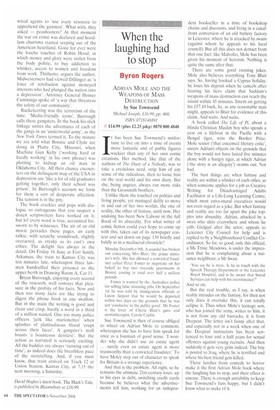When the laughing had to stop
Byron Rogers
ADRIAN MOLE AND THE WEAPONS OF MASS DESTRUCTION by Sue Townsend Michael Joseph, £16.99, pp. 460, ISBN 0718146891 (C) £14.99 (plus £1.25 p&p) 0870 800 4848 It has been Sue Townsend's misfortune to live on into a time of events more fantastic and of public figures wackier than any of her own comic creations. Her method, like that of the authors of The Diary of a Nobody, was to take a credulous nerd, strip him of any sense of the ridiculous, then to loose him on the real world and his own diary. But she, being angrier, always ran more risks than the Grossmith brothers.
Unlike them she touched on politics and living people, yet managed deftly to move in and out of her two worlds, the one of reality, the other of fantasy, until now. Her undoing has been New Labour in the full flood of its absurdity. For what writer of comic fiction could ever hope to come up with this, taken out of its newspaper context and set down on page 139 briefly and baldly as in a mediaeval chronicle?
Monday December 9th. A scandal has broken out concerning Mrs Blair, the prime minister's wife. She has allowed a convicted fraudster called Peter Foster to negotiate on her behalf to buy two riverside apartments in Bristol, costing in total over half a million pounds.
Foster is wanted by the Australian police for selling false slimming pills. On September 1st he was told by immigration officials at Luton Airport that he would be deported within two days on the grounds that he was not 'conducive to the public good'. Mr Foster is the lover of Cherie Blair's guru and aromathcrapist, Carole Caplin.
Sue Townsend is then of course obliged to wheel on Adrian Mole to comment, whereupon she has to have him speak for once as a fountain of good sense. 'I wonder why she didn't use an estate agent . .. surely even an estate agent is more trustworthy than a convicted fraudster.' To have Moley step out of character to speak for Britain is a strange experience.
And that is the problem. All right, so he remains the ultimate 21st-century loser, up to his eyes in debt, switching credit cards because he believes what the advertisements tell him, working for an indepen
dent bookseller in a time of bookshop chains and discounts, and living in a canalfront conversion of an old battery factory in Leicester, where he is attacked by swans (against whom he appeals to his local council). But all this does not detract from that one fact: like Malvolio, Mole has been given his moment of heroism. Nothing is quite the same after that.
There are some good running jokes. Mole also believes everything Tony Blair says. So, having booked a Cyprus holiday, he loses his deposit when he cancels after hearing his hero claim that Saddam's weapons of mass destruction can reach the island within 45 minutes. Intent on getting his £57.10 back, he, as any reasonable man might, appeals to Blair for evidence of this claim. And waits. And waits.
A book called The Life of Pi, about a Hindu Christian Muslim boy who spends a year on a lifeboat in the Pacific with a Bengal tiger, wins the Booker Prize. Mole senior (That esteemed literary critic', sneers Adrian) objects on the grounds that the boy would not have lasted five minutes alone with a hungry tiger, at which Adrian ('the story is an allegory') storms out. Not bad.
The best things are when fantasy and reality are within a whisker of each other, as when someone applies for a job as Creative Writing for Disadvantaged Adults Facilitator at a Life-Long Learning Centre, which most extra-mural executives would not even regard as a joke. But when fantasy and reality are too far apart the joke topples into absurdity. Adrian, attacked by a swan who shits everywhere and whom he calls Gielgud after the actor, appeals to Leicester City Council for help and is replied to by a Neighbourhood Conflict Coordinator. So far, so good, only this official, a Ms Trixie Meadows, is under the impression that he is complaining about a nuisance neighbour, a Mr Swan.
You say he is mute. Is he in touch with the Speech Therapy Department at the Leicester Royal Hospital, and is he aware that Social Services can help with his incontinence?'
And so on.
But the real trouble, as I say, is when reality intrudes on the fantasy, for then not only does it overtake this, it can totally eclipse it. Thus when Mole's teenage son, who has joined the army, writes to him, it is not from any old barracks, it is from Deepcut. The letter isn't funny after that, and especially not in a week when one of the Deepcut instructors has been sentenced to four and a half years for sexual offences against young recruits. And then suddenly it gets very grim indeed. The boy is posted to Iraq, where he is terrified and where his best friend gets killed.
These lurches from comedy to horror make it the first Adrian Mole book where the laughing has to stop, and their effect is unease. There is enough amiability to keep Sue Townsend's fans happy, but I didn't know what to make of it.


























































































































 Previous page
Previous page